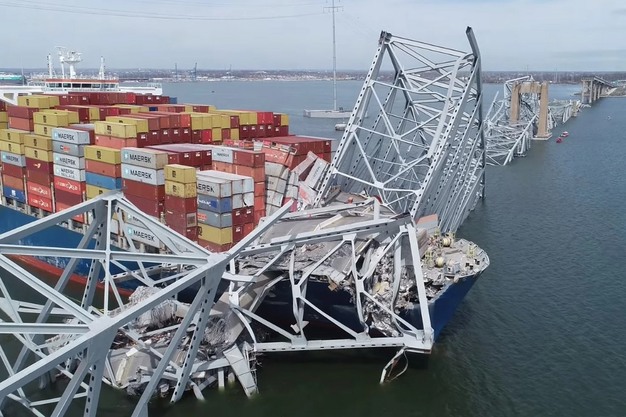In the realm of produce, it seems that Tuesday's collapse of the Francis Scott Key Bridge in Baltimore is having more of a logistical impact on produce shipments on the customer/vendor side of the business rather than emerging as a supply chain issue.
Richard Scher of the Port of Baltimore says that vessel traffic into and out of the Port of Baltimore is suspended until further notice. "This does not mean the Port of Baltimore is closed. Trucks are being processed within our marine terminals. At this time we do not know how long vessel traffic will be suspended. As soon as that is determined we will provide an update," says Scher.
 The collapse of the Francis Scott Key Bridge on Tuesday. Photo: Wikipedia.
The collapse of the Francis Scott Key Bridge on Tuesday. Photo: Wikipedia.
Rerouting traffic
"It's still very fresh for us so it is hard to tell what the true impact will be. We have had to reroute any deliveries that we had," says Omar El Sawi, vice president, evening sales and purchasing for Edward G. Rahill & Sons Inc. in Jessup, Maryland. He notes that shipments are now dealing with the tunnel to transport goods rather than crossing over the bridge which collapsed after a container ship crashed into the bridge. "It's made it more challenging but it's not terrible but we'll see what happens." In turn, drivers are factoring in new extra drive times onto the reroutes.
Into the Port of Baltimore itself, it's largely one handling the movement of automotive vehicles but also dry goods via the water. "When they redid Baltimore years ago, the whole idea in building the produce market in Jessup (Maryland) was to move a lot of that commercial traffic out of Baltimore. Most of the produce instead went to the Port of Philadelphia and the Port of Virginia in Norfolk," says El Sawi, adding that produce will then of course be trucked into Baltimore from there. "They just made it more difficult for produce to move through Baltimore."
For more information:
Richard Scher
Port of Baltimore
https://mpa.maryland.gov/
Omar El Sawi
Edward G. Rahill & Sons Inc.
https://www.rahllproduce.com/
